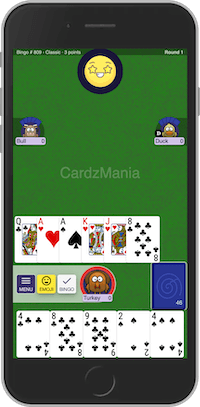Overview
Bingo is a classic game where players hope that a caller calls out cards in their hand. Bingo is very popular for both young and old card players and can be played with 2 to 12 people.
Play Multiplayer Bingo Online
The Deck and the Deal
Bingo is played with 2 standard decks of 52 playing cards. After both decks are shuffled separately, one deck is given to the caller while the other deck is dealt out to the Bingo players. The number of cards dealt for 2 to 10 players is 5. For 11 or 12 players, 4 cards are dealt.
How to Play
After the cards are dealt, the caller selects the top card of their own deck and calls out the rank and suit. If a player has the card called out in their hand, they turn that card over or mark it for themselves. The caller then calls out the next card. Play like this continues until a player meets the winning criteria and yells out 'Bingo!'
Scoring
The player who calls out Bingo receives 0 points. If a player could have called out Bingo but didn't, they receive 1 point. Any player who has 1 or more unmatched cards at the time of Bingo, receives 2 points.
Winning
Each round ends when a player makes Bingo. The game ends when a predetermined number of rounds is met. The player with the lowest points wins the game.
Variations
CardzMania supports several customizable rules and options so you can play Bingo exactly how you like or how you grew up playing with your friends and family. In addition to the classic way of playing, we often have new creative options for you to try to spice up the game if you are interested in trying different spins for fun.
Points
Players determine a set amount of points when the game ends.
Rounds
Players determine a set amount of rounds (also known as hands or deals) that the game will go to (instead of the points selection above).
Timer
Players only have a set amount of time to make their turn after which a turn is automatically played for them and the game proceeds: Fast is 7 seconds, Standard is 15 seconds, Slow is 30 seconds, and Very Slow is 60 seconds. Players can also choose to disable the timer, but that is only for private tables.
Cards
Players can determine the number of cards dealt. The available options are 3, 4, 5, 6, 7, 8, 9, 10, 11, 12, and 13
Penalty
Players can decide how many card calls a person cannot yell Bingo for if they previously yelled out bingo incorrectly. The available options are Disabled, 1, 3, 5, 7, 10, 15, 20, and 25.
Limit
Players can limit the number of called cards that are displayed to everybody. The available options are Disabled, 3, 5, 7, 10, 15, 20
Scoring
Players can decide whether to score based on unmatched cards or not. When enabled, the bingo winner receives 0 points while the other players receive 1 point + 1 point per unmatched card. When disabled, players receive 2 points if they have any unmatched cards and 1 point if they could have called Bingo but didn't.
Classic Basics
Classic games vary to a great degree in terms of rules and objectives. A thread that binds them all is their simplicity and age. Classic games are typically easy enough for young children to play them and have typically been around for many years.
Card Game Basics
A deck of cards consists of 52 cards, with 4 distinctive subgroups. Each of these subgroups is recognised by a symbol and are referred to as suits. They consist of Clubs, Spades, Hearts and Diamonds. Each suit contains 13 cards which, generally, are considered in this order, Ace (A), 2, 3, 4, 5, 6, 7, 8, 9, 10, Jacks (J), Queen (Q) and King (K). Some games include the two Jokers found in a standard deck but most games don't.
Feedback
Would like to discuss new features or variations for Bingo? Need a custom rule? Have a question? Got a suggestion? Don't see a game you want to play? Please contact us by
email, facebook or twitter - we really value your feedback and love hearing from all of you!
This site uses cookies. By continuing to browse the site you are agreeing to our use of cookies.




